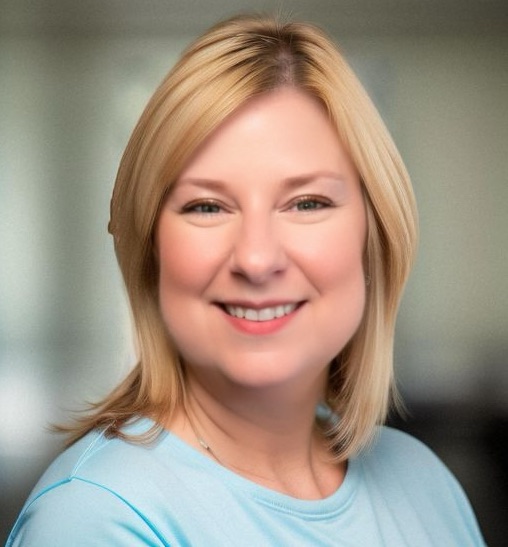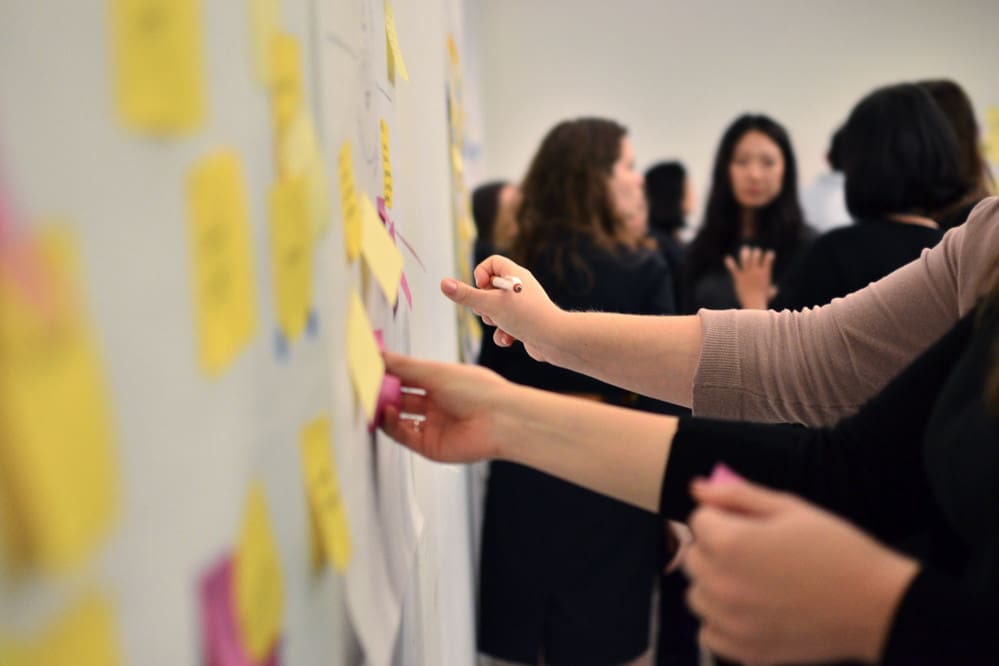
Meet the Coach: Interview with Senior Career Coach Lisa Iarkowski
May 13, 2025 Written by Cynthia Orduña

Compare Providers
Download our outplacement comparison sheet
Request Pricing
Compare our rates to other providers
Lisa Iarkowski, Senior Career Coach at Careerminds, brings a unique blend of executive leadership and coaching expertise to support professionals during career transitions. With over 15 years of leadership experience in corporate operations and project management—most notably at Pearson—Lisa brings a strategic, whole-person approach to coaching, helping clients navigate complex career moves and reach their full potential.
Lisa has coached over 700 professionals from individual contributors to C-suite executives across sectors such as media, technology, edtech, and publishing. She assists clients in clarifying career options, creating effective job search strategies, honing their personal brand, and mastering interview and negotiation skills. Her coaching approach integrates evidence-based methodologies, mindset coaching, and tailored strategies to help clients achieve their career goals.
Lisa’s extensive background includes executive leadership roles at Pearson and Prentice Hall, where she managed operations and project management for businesses with $600M–$1B in annual revenue. She led large-scale organizational change initiatives, coached high-potential talent (80 percent of whom were promoted), and developed innovative training programs to support company-wide digital transformation.
A certified executive coach from Columbia University and John Mattone University, Lisa also holds certifications in change management (Prosci) and career coaching (GetFive). She earned an M.A. in Interdisciplinary Studies from Kean University and a B.A. in English Literature from Lake Forest College. Beyond her professional work, Lisa is a committed community volunteer who contributes her time to literacy tutoring and food security initiatives in the Hudson Valley of New York.
In this conversation, she shares her approach to career coaching, building confidence, and her journey from corporate leadership to coaching.
1. What Does Your Role Entail as a Senior Career Coach at Careerminds?
I work with people across all industries and levels, from individual contributors to C-suite executives, who are in job transition. I help them with everything from resumes, LinkedIn profiles, and interviewing to salary negotiation and career exploration. Sometimes this includes guiding people through career changes or helping them pursue more purpose-driven or mission-aligned work.
Beyond logistics, there’s also an emotional component. Many clients are recovering from layoffs or toxic work environments, and their confidence is often shaken. Part of what I do is help them process the emotional impact and rebuild their confidence.
2. How Do You Help Clients Manage Their Emotions and Build Confidence?
One powerful way is through reflection. I guide clients to look at their entire career, not just their most recent role, and identify their successes. Updating a resume can actually be a confidence booster because it tells the story of the value they’ve delivered. We often use the STAR format (Situation, Task, Action, Result) to highlight accomplishments and impact.
When people start recognizing the value they’ve brought to teams, organizations, or clients, they begin to reconnect with their professional worth. That’s where the real confidence building begins.
Emotional regulation can be harder, especially if someone feels triggered by an interviewer’s behavior. I sometimes introduce clients to a method called Positive Intelligence, which I’m trained in. It’s a neuroscience-based practice similar to mindfulness, but more tactical. It helps shift people out of reactivity and into a more thoughtful, responsive state. This can be incredibly helpful during interviews, where you can’t control how others behave but can control your response.
If you’re looking for ways to empower and support your employees through challenging career transitions and reduction events, click below to connect with our outplacement experts and see how Careerminds can help you navigate the delicate process.
I spent a long career in educational publishing, media, and digital learning. My last role was VP of operations and program management at Pearson, overseeing large teams and billions of dollars in business. Leading people was a huge part of that role, and I developed strong coaching and mentoring skills over time.
When I left Pearson, I didn’t know what was next. I did deep work around identifying my core values and realized the common thread in my career was coaching, especially emerging leaders and team members. That insight led me to pursue an executive coaching certification from Columbia University.
4. What Led You to Focus Specifically on Career Coaching?
I initially thought I’d do executive coaching, but every client I worked with wanted help with career transitions. Eventually, I had to admit that my niche had found me! So I leaned into that and now coach many clients, especially women, on their career journeys.
However, I never expected to go into outplacement coaching. One of my clients mentioned a company called GetFive, which provided coaching when they were laid off. I checked out their career coaching certification and,. since I love structure and process to help clients feel grounded, I decided to pursue it. It was a great addition to the confidence-building and storytelling work I was already doing.
Eventually, I was hired by GetFive and became the associate director for their certification program. I also trained and certified coaches, which brought my teaching background full circle.
5. What Do You Find Most Fulfilling About Working with Participants at Careerminds?
I just love people. Coaching one-on-one and helping them through their specific problems or transitions is incredibly meaningful. Even though I’ve held leadership roles, I always found the most joy in day-to-day personal work. The most fulfilling moments are when someone lands a job or experiences a transformation.
One client, for example, was brilliant but struggled in interviews. After doing prep together, I reminded her not to overlook the likability factor and start smiling more in her interviews. She took that advice in her next interview, got the job, and then told me, “I smiled more.”
Sometimes, small changes make a big difference. I know that might sound too simple, but people often forget how important energy and likability are. All things being equal, people hire who they want to work with—someone approachable, collaborative, and enjoyable. A warm presence goes a long way.
I’ve coached multiple clients on this and seen real results. Helping people get aligned with their purpose and take brave leaps is what lights me up.
6. What Value Does a Service Like Careerminds Bring to Individuals and Companies?
That’s a really good question. One key thing is having a process. A lot of people, especially those who haven’t job searched in 10, 15, even 20 years, don’t know where to start. When the rug gets pulled out from under them, they need a foundation or “floor” to stand on.
That’s what Careerminds provides: a structured, supportive process with resources that help people move forward.
The online resources and webinars are very helpful too. I often tell participants that every lesson, every resource, and every webinar is designed to answer three questions:
- How should I approach this?
- What strategies can I use?
- What are some practical, tactical steps that I can take?
People need a workflow, a methodology, something that helps them feel grounded again.
If you’re interested in learning more about Careerminds’ industry-leading outplacement services and how we stack up against other providers—including our comprehensive list of program services, competitive participant-to-coach ratio, lowest fees, superior responsiveness, professionalism, and results—click below to download our free outplacement comparison sheet.
7. How Do Participants Tend to Use Careerminds’ Services?
Some fully take advantage of the coaching support; others only want help with their resume. Honestly, getting a really strong resume is a high value on its own. If someone had to pay for that outside of Careerminds, it would cost a lot.
There are also tech tools like career.io, which now bring AI into the job search process. These tools are important because they help validate what people are hearing out in the world. It can be hard to parse all of the information available from the internet, friends, and family, but our resources are curated and based on proven best practices. They cut through the noise.
Tony Robbins always says, “Success leaves clues.” That’s what these tools and processes give people: real examples of what’s worked for others.
8. What Makes Careerminds Unique Compared to Other Outplacement Providers?
One thing that makes Careerminds stand out now is the integration with career.io. I’d say our move toward automating the job search process and integrating AI, especially tools around career exploration, is unique and offers participants an all-in-one experience.
Here’s what stands out about Careerminds outplacement with career.io:
- Resume builder: This helps participants reformat their resumes with more polished templates.
- Tailor your resume: This tool helps participants keyword-optimize their resumes to get past applicant tracking systems. Before this, we used to recommend third-party tools like Jobscan when our internal options didn’t have this capability.
- Job tracker: Participants can save and track job postings, whether they find them through career.io or elsewhere using a browser extension.
- AI interview prep: This can be helpful, especially for online or one-way interviews. While I don’t think it should replace all interview prep, it’s a great tool for practicing responses.
These features give our outplacement participants a more seamless, centralized, and tech-forward job search experience than other providers can offer.
9. What’s One Piece of Advice You Frequently Give to Individuals Going Through a Career Transition?
There’s not just one! But if I had to choose, I always tell people that career transition is a marathon. This means that you need to set weekly goals, pace yourself, and most importantly—take care of your well-being.
The biggest piece of advice I give—and it might sound counterintuitive—is to do more of whatever brings you joy. Whatever you do in your life that lights you up, make space for more of that now.
I also often say that this is an excellent time to upskill. When we upskill, we’re opening our minds to learning, engaging our curiosity, and doing something productive and enriching. When people aren’t working, they often miss the mental stimulation of using their skills. Upskilling can help fill that gap.
It also gives you something valuable to talk about in interviews. You can say, “While I’ve been in transition, I’ve also been upskilling in these areas.” I always tell clients not to only brush up on old skills. Look ahead and ask yourself, what trends are emerging in your industry? What do you want to learn more about? AI is a great example that’s valuable to get your head around.
So yes, upskilling would be my top advice.
If you are interested in learning more about our industry-leading outplacement programs, click below to speak with our experts and see if Careerminds is the right outplacement partner for your organization.
In need of outplacement assistance?
At Careerminds, we care about people first. That’s why we offer personalized talent management solutions for every level at lower costs, globally.



